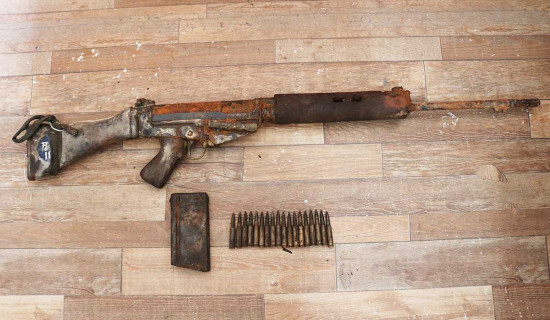- Saturday, 14 February 2026
Rai makes millions from flowers
BY NISHA RAI,Dharan, Apr. 3: Dharan is a beautiful city in eastern Nepal. Houses adorned with flowers are quite common in Dharan; almost every house has a garden filled with flowers.
Yamenhang Rai, 39, from Dharan Sub-metropolitan City-20, has now become a florist. With a fondness for flowers, she has been involved in floriculture for about seven years by establishing a nursery called 'Everest Nursery Farm'.
Rai, who was involved in cattle farming in the past, shifted to flower cultivation after cattle farming became expensive and many locals showed interest in the flowers planted by her. Now, she has been supporting a family of seven through the flower business.
She said, "I have been passionate about flowers since my childhood. I used to bring flowers from the market and relatives and plant them in the garden. That's why I have many varieties of flowers in the garden."
She expresses happiness over being able to make a living through flower business. She spends her time in activities like chomping, watering, propagating and trimming plants. Besides, during festivals and fairs in Dharan, she does business by setting up flower stalls.
According to Rai, she prepares seeds of local flowers on her own and purchases seeds of exotic flowers. She said that besides importing seeds from countries like India, flowers were also imported from Thailand, Japan, Germany and other European countries. Among them, many seasonal flowers were sold due to high demand.
She said that seasonal flowers starting from Rs. 80 to Rs. 80,000 could be found in her nursery. She said that in recent times, many youths have been interested in plants and cacti resulting in increased sales of plants, cacti and seasonal flowers as social media platforms have played an important role in informing and displaying flower varieties. She said that there were more than 3,000 varieties of plants in her nursery.
She said that at present Kanchira (Bengal dayflower) was popular as it could be used as decorative plant. Additionally, its leaves do not wither for five to six years, so everyone likes it, she said. The price of small plants costs around Rs. 500, whereas advanced species cost up to Rs. 6,000.
Rai said, "Although the income varies from time to time, it ranges from Rs. 1.5 to 2 million annually. With this, both household expenses and education expenses of two children are covered."
Meanwhile, the flower business of Nepal has not been able to take the international market since the Nepal government has not given priority to the business. Though many new species of flowers exist in the country, they have not been named yet. It might take a while for the government to name them.
Rai said that since the government has not made arrangements for the production of new species of plants in the country, our unique flowers have not found a place in the international market.
She said despite having flowers that were not found internationally, the government had not taken the initiative to take them into the international market.
According to Rai, flowers needed to be imported from India during festivals like Tihar and Valentine's Day due to low flower production in the country. She said that flower cultivation in the country turns out to be expensive compared to other countries as necessary materials like plastic, seeds, greenhouse equipment, fertilizers and others need to be imported.















